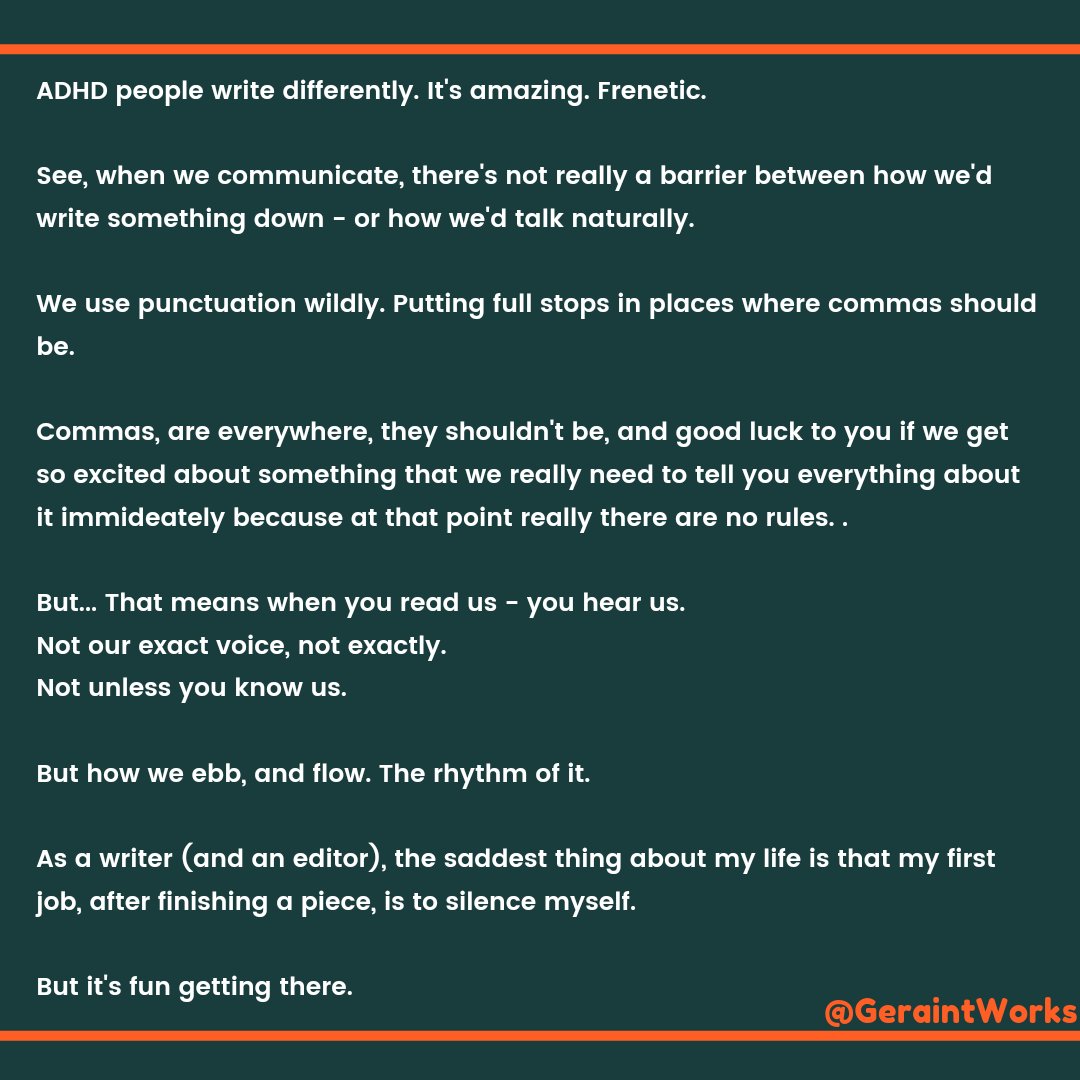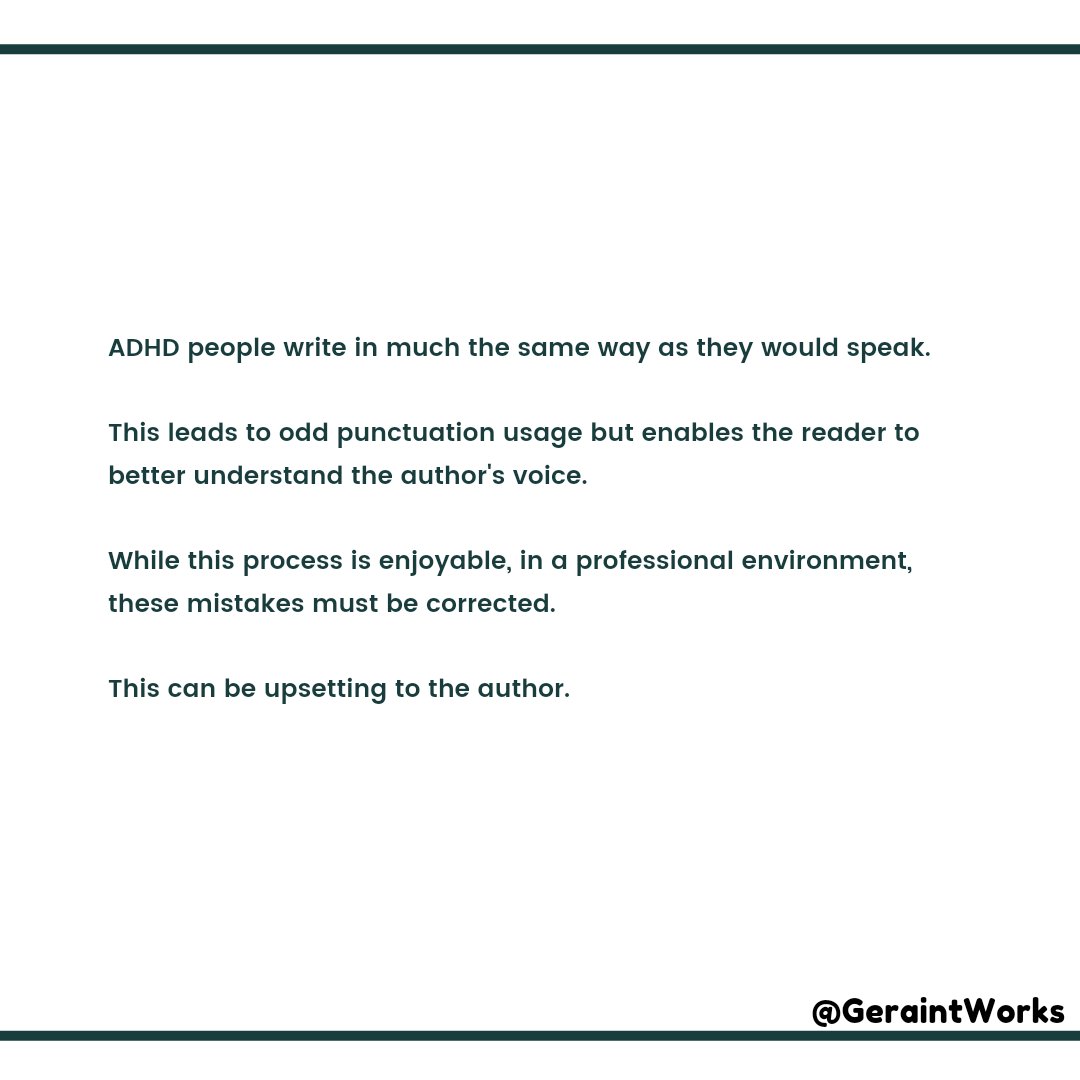
Mythbusting ableism?
I'll start.
Non-ADHDers, who take adderall to help them study, are statistically *more likely to fail* than the non-ADHDers who don't.
ADHD students who take adderall are statistically *as likely to pass or fail* as non-ADHDers who don't take adderall.
I'll start.
Non-ADHDers, who take adderall to help them study, are statistically *more likely to fail* than the non-ADHDers who don't.
ADHD students who take adderall are statistically *as likely to pass or fail* as non-ADHDers who don't take adderall.

Learning this was important for me.
ADHD (in the USA especially) has become a sort of moral panic. But... Its hard to fight doctors.
So, as with all moral panics, they start to try and pin things that society considers wrong on it.
In this case. Cheating.
ADHD (in the USA especially) has become a sort of moral panic. But... Its hard to fight doctors.
So, as with all moral panics, they start to try and pin things that society considers wrong on it.
In this case. Cheating.
Academic Doping with Adderall is largely a made up problem.
But.
Academic Doping *concerns* are a brilliant way to attack ADHD (and ADHDers by extension).
It let's you do 4 things all at the same time.
But.
Academic Doping *concerns* are a brilliant way to attack ADHD (and ADHDers by extension).
It let's you do 4 things all at the same time.
1. It creates a perception that ADHD drugs are widely (and effectively) used to cheat.
- this has the added effect of undermining the achievements of actual ADHDers on meds.
- this has the added effect of undermining the achievements of actual ADHDers on meds.
2. That let's you make the argument that ADHD is over-diagnosed, by creating the perception that people are seeking diagnosis purely to cheat.
- this has the added effect of making it much harder for actual ADHDers to get a diagnosis
- this has the added effect of making it much harder for actual ADHDers to get a diagnosis
3. Together these let you build the narrative of drug abuse. Adderall is a stimulant > people fake adhd for grades > get hooked > die.
- this has the added effect of stigmatising actual ADHDers for using medication, while making it harder for them to access it.
- this has the added effect of stigmatising actual ADHDers for using medication, while making it harder for them to access it.
4. From drug abuse you can manipulate *parents* - who are required for diagnosis, possibly to pay for the meds in countries like the USA (but even elsewhere, as they're often required to provide evidence of an adult's childhood behaviour).
Parents are quite naturally unlikely to want their children to get addicted to drugs and die. And so can resist enabling diagnosis or treatment.
- this has the added effect of... Well, all of the above for actual ADHDers.
BUT ALSO....
- this has the added effect of... Well, all of the above for actual ADHDers.
BUT ALSO....
...and this one is the real kicker.
ADHD meds have been proven to reduce the likelihood of addictive behaviours in ADHDers. So, by scaring parents into denying access to meds, they're actually *increasing* the chances of addiction.
ADHD meds have been proven to reduce the likelihood of addictive behaviours in ADHDers. So, by scaring parents into denying access to meds, they're actually *increasing* the chances of addiction.
It's a bit of incredibly effective propaganda, that tackles a problem that doesn't exist - which literally only makes life harder for ADHD folks.
And here's the internalised ableism.
I literally believed it until I read up on it. And all those associations that come with it.
And here's the internalised ableism.
I literally believed it until I read up on it. And all those associations that come with it.
This makes us doubt *each other*, it makes us look at anyone from friends to tiktokkers and be like 'oh rly tho'.
And I'm not saying that no non-ADHDers effectively use adderall to be productive. It's probably *possible* to have a healthy relationship to any drug.
And I'm not saying that no non-ADHDers effectively use adderall to be productive. It's probably *possible* to have a healthy relationship to any drug.
But - it's not what's actually happening en masse. So we really need to stop believing those arguments, or responding to those claims.
Someone comes at you with that, don't try and win or equivocate. Just be like - 'oh that's a common myth, do the reading and come back to me'
Someone comes at you with that, don't try and win or equivocate. Just be like - 'oh that's a common myth, do the reading and come back to me'
TL;DR - academic doping is BS ableist propaganda that undermines ADHD experience and makes it more difficult to access Dx and treatment.
And we need to stop accepting and perpetuating it.
And we need to stop accepting and perpetuating it.
Was gonna do a whole sources thing but now I've read too much. Can't find the original study I was referring to but other learnings. These are all quick Googles.
- adderall is less effective than a placebo at improving academic performance in NTs.
- adderall is less effective than a placebo at improving academic performance in NTs.
- adderall and ritalin have been shown numerous times to not improve cognitive function, and to actually impair working memory in NTs.
- adderall doesn't even seem to improve cognitive function in ADHDers, though it does help control behaviours which can disrupt study.
- adderall doesn't even seem to improve cognitive function in ADHDers, though it does help control behaviours which can disrupt study.
- ADHDers are actually slightly less likely to achieve expected grades even when on medication - though perform better (and are less likely to drop out) than those without.
- adderall can actually harm study in NTs because it can cause overstimulation. Which is a medium lol.
- adderall can actually harm study in NTs because it can cause overstimulation. Which is a medium lol.
- statistically NTs who misuse adderall or ritalin are no more likely to become drug addicts than the rest of the population.
Going to explain why this matters.
One group has sugar pill. One has adderall. Both believe its adderall.
Sugar pills did better - they believed they would on meds.
Adderallers also believed it - which means meds *impeded* their performance.
One group has sugar pill. One has adderall. Both believe its adderall.
Sugar pills did better - they believed they would on meds.
Adderallers also believed it - which means meds *impeded* their performance.
https://twitter.com/GeraintWorks/status/1396085735229362176?s=19
• • •
Missing some Tweet in this thread? You can try to
force a refresh






